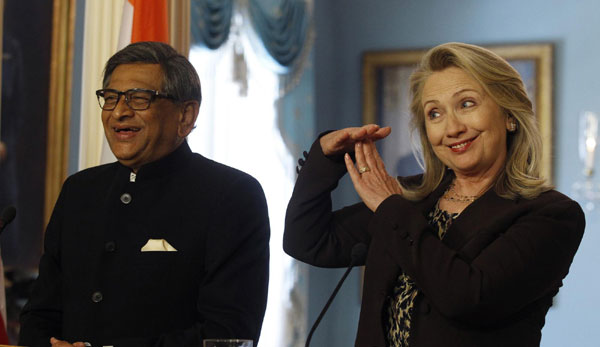
WASHINGTON - US Secretary of State Hillary Clinton on Wednesday highlighted the progress made in the US- India relations in areas including trade, investment and nuclear energy.
|
 United States Secretary of State Hillary Clinton (R) calls a time-out during a multiple question from an Indian journalist, as India's Minister of External Affairs S.M. Krishna smiles during their news conference at the US-India Strategic Dialogue in Washington June 13, 2012. [Photo/Agencies] |
At a press conference after the annual US-India strategic dialogue, Clinton said the "strategic fundamentals" of the relationship are pushing the two countries' interests into "closer convergence".
"Today there is less need for dramatic breakthrough that marks earlier phases in our relationship, but more need for steady, focused cooperation aimed at working through our differences and advancing the interests and values that we share," said Clinton, alongside Indian Minister of External Affairs Shri S.M. Krishna.
Since he took office in 2009, US President Barack Obama has vowed to build a strong partnership with India. However, some observers believe the relationship has been overstated.
Clinton cited the preliminary deal signed by Westinghouse Electric and India's Nuclear Power Corporation on Tuesday to build nuclear reactors in India, as progress in civil nuclear energy.
The agreement committed both companies to work toward the preliminary licensing and site development work needed to begin construction of new reactors in Gujarat, a western state of India.
Despite "a lot of work" that still needs to be done, Clinton hailed it as a "significant step toward the fulfillment of the landmark US-India nuclear agreement."
Some in America have complained that the nuclear agreement signed during the Bush administration in 2008 has been so radically altered by India's parliament that US businesses may be frozen out of the market.
On the economic front, Clinton said on Wednesday morning that the bilateral trade and investment may exceed 100 billion US dollars this year, a 40 percent growth since 2009.
"There's a lot of room, however, for further growth, and we need to keep up the momentum," she noted, adding that Washington looks forward to further reduce barriers to trade and investment in areas like multi-brand retail.
In November last year, Indian government changed its plan on allowing multi-national corporations like Wal-Mart to access its retail sector, fueling frustration among the American business community.
On security and defense cooperation, Clinton said bilateral defense trade has surpassed eight billion dollar over the last five years, which is a great progress.
Clinton also mentioned other progress areas such as education, people-to-people ties and the handling of Iran's disputed nuclear program.
For his part, Krishna said the two countries were making tangible and continuous progress on areas from trade to energy to higher education.